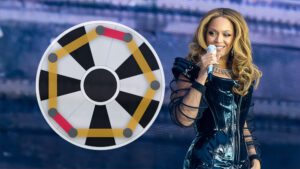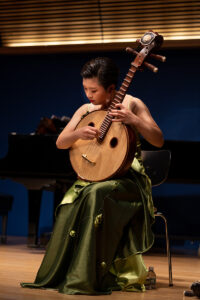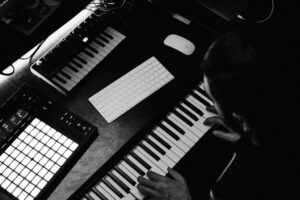This blog post is a transcription of an interview. The following discussions have been lightly edited for length and clarity. Watch the full interview.
Yueqin Chen is a classically trained ruan and liuqin artist based in New York. Born and raised in Shanghai, she started playing ruan at the age of five and liuqin at age nine. Chen was admitted into the Shanghai Conservatory of Music in 2003 and studied ruan and liuqin performance with Professor Wu Qiang. In 2007, her ensemble Jin Qi (金豈组合) took first place in the National Classical Chinese Music Competition. She continued to perform and record after moving to New York and has since appeared at Carnegie Hall, the Lincoln Center of Performing Arts, and the 2015 Met Gala with Rihanna. Chen has been a member and featured soloist of the Chinese Music Ensemble of New York since 2013 and served as the organization’s Artistic Director from 2018 to 2021.
We are excited to have Yueqin joining the Synapse team as one of our featured artists, and we invited Yueqin to share more about her instruments, and her musical interests with us in an interview on August 25, 2023.
How did you first get into your instruments?
Actually, it was a complete coincidence. My mom sent me to a kindergarten with a strong focus on music when I was four. However, somehow, I registered for classes too late, and most of the “popular” instruments were already taken by other kids. Then, out of nowhere, the kindergarten principal just pitched this idea to my mom: “Hey, how about ruan?” Then the teacher moved on to show me what a ruan is, and in fact, the instrument was displayed at a place that was too high for me even to see, and my mom had to lift me up. I was instantly interested in the ruan, because I thought the instrument looked like a smiley face, and that’s cute. That’s how I got into it, and at that time, I knew nothing about the sound of this instrument, not to mention the rich history of this instrument.
Of course, I didn’t just stop there. In 2003, I was admitted to Shanghai Conservatory to study with Prof. Wu Qiang. It’s at the conservatory where I really got to learn the instrument and the unique voice of this instrument. After school, I continued to play and work with other musicians and composers. I never stopped learning about this instrument. Every time I work with someone new, new possibilities would come, and that’s what always fascinated me.
I know you play both liuqin and ruan. Can you describe the differences?
They have different personalities. Ruan’s register is on the lower end, and to a lot of people, ruan sounds somewhat like a guitar. To me, ruan has a very warm and deep voice and a lot of echo, and you can create a wide range of sound through different articulations and other playing techniques. On the other hand, liuqin has a much higher pitch range and is less resonant. It has a brighter vibe to it.
Where do you see yourself in the community of Chinese musicians?
I’m a pretty free-spirited musician, and in Chinese, I would call myself a pretty “任性的” [free-spirited] artist. Some people might argue that if you love something, you’d do it for a living. But I don’t think that’s the best fit for me. On the other hand, since I am not playing ruan for a living, I have the liberty, or the freedom to choose what I play, and I don’t have to play things I’m not interested in so that I can pay next month’s rent. This is the “任性” aspect – I only work with what I actually enjoy, and I only play what I want to play. I am passionate about the work and the collaboration. The process of music making is quite similar to movie making. When I receive a score from a composer, it’s like I got the script from the director, then it needs to be acted out to connect to the audience. I see myself as the actor who connects, and that’s what I enjoy the most.
What made you interested in collaborating with us?
This is a nice continuation of the last question. I enjoy working with composers and performers, and I enjoy the process that leads to truly unique end results. When you guys first reached out to me, I was fascinated by the idea of directly connecting composers to performers and having composers learn about the voice that’s been perceived by us performers as unique. With the presence of both parties, we can truly explore what is possible for the instrument, and I’m excited to work with composers who may or may not have worked with my instrument before. This is something I always wanted to do myself, but I haven’t figured out a way to do so just yet. So it is super awesome for me to find out that you guys are doing the thing that not only raises the awareness of ruan and other non-western instruments out there; but also allows composers to write pieces that will work well with the instrument. This is very exciting!
Tell the audience about the upcoming concert.
Come and enjoy! This might be an instrument you have heard before, but maybe you don’t know what’s behind the scenes–the history, interesting stories associated with the music, and unique performance practices–come check those out! It might also be possible that you have never seen or heard of this instrument before. And this would be an exciting new experience for anyone who’s interested in this.
Yueqin will host the Synapse Virtual Concert on September 9, 2023 at 5pm Eastern on the Synthase YouTube Channel. We look forward to seeing you there!


